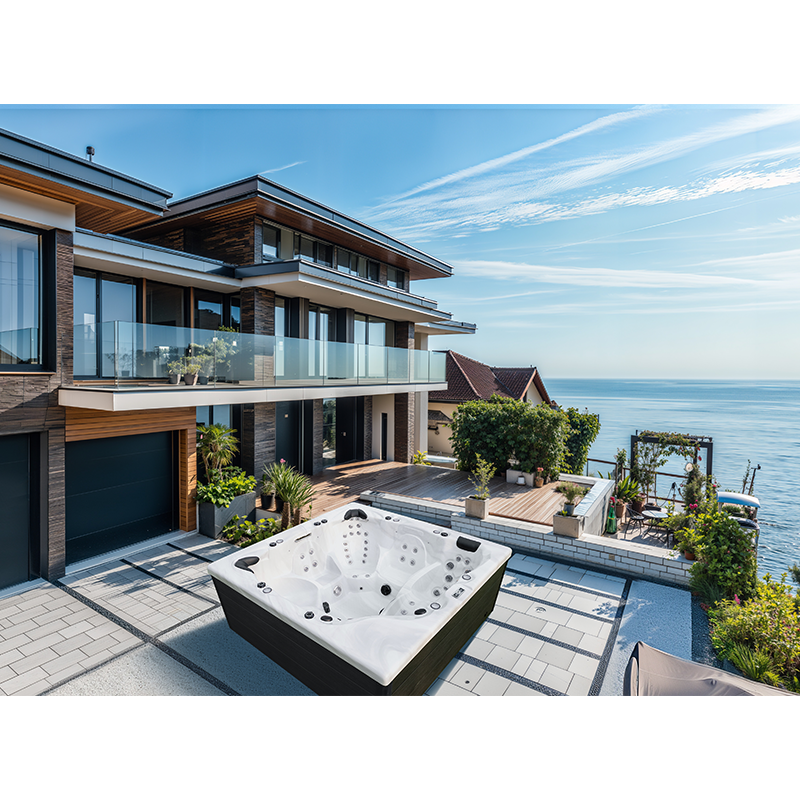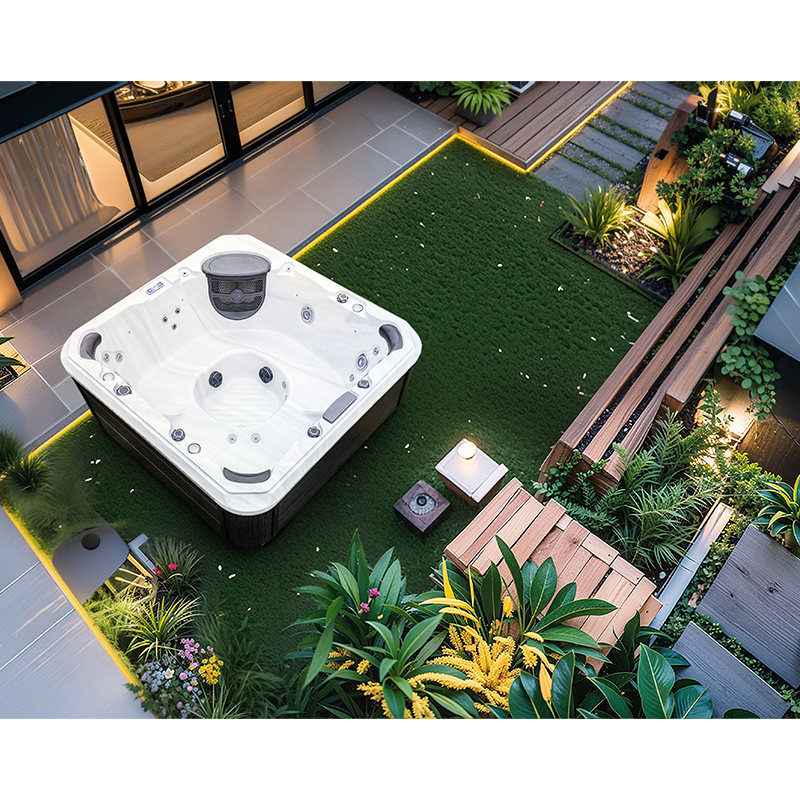
Does the outdoor spa jacuzzi have any requirements for water quality?
2025-01-25 15:30The outdoor spa jacuzzi not only provides people with the function of relaxing and relieving stress, but also becomes an important place for family entertainment, socializing and leisure. However, in order to ensure that the experience of using the spa bathtub is both comfortable and safe, the management and maintenance of water quality are particularly important. Many users often ignore the impact of water quality on the spa effect and equipment life when using the spa bathtub. In fact, the outdoor spa jacuzzi has strict requirements for water quality. The quality of water is not only related to human health, but also directly affects the use effect of the spa bathtub and the life of the equipment.
This article will explore the requirements of outdoor spa jacuzzi for water quality, analyze in detail the problems that may arise when the water quality is unqualified, and provide professional suggestions for water quality management and maintenance to help users ensure the best use experience of the spa bathtub.

Does the outdoor spa jacuzzi have any requirements for water quality?
Due to the special design of its water circulation and water flow system, the outdoor spa jacuzzi has stricter requirements on water quality than ordinary bathtubs. The requirements for water quality are analyzed mainly from the following aspects:
1. Cleanliness of water
The water flow of the spa bathtub needs to be kept clean to ensure the comfort and health of the user. If impurities, dirt and microorganisms in the water are not cleaned in time, the water quality may deteriorate, affecting the user experience and even causing health problems.
● Sources of water pollution: The sources of water pollution usually include sweat, sebum, cosmetic residues, body hair, dust and fallen leaves in the external environment, and bacteria in the air.
● Risk of dirt accumulation: If these pollutants accumulate in the water for a long time, they will not only make the water turbid, but also breed bacteria and algae, causing the water to stink, and even become the source of health hazards such as skin allergies and infections.
2. Chemical composition of water
In addition to the cleanliness of water, the chemical composition of water is also a key factor in the management of spa water quality. Chemical substances in water directly affect the normal operation of the spa bathtub and the health of users. Common chemical components that need to be paid attention to include:
● pH value: The pH value of water is an indicator of the acidity and alkalinity of water. The ideal pH value of spa water should be maintained between 7.2 and 7.8. Too low a pH value will make the water acidic, which may corrode spa equipment and irritate the skin and eyes; while too high a pH value may cause scale formation, reducing the efficiency of spa equipment.
● Hardness: The hardness of water is determined by the calcium and magnesium ion content in the water. When the water hardness is too high, it will cause scale formation, which will not only reduce the heating efficiency of the spa, but also cause clogging and damage to the equipment. Therefore, soft water treatment is particularly important in spas.
● Chlorine content: Many spas use chlorine or other disinfectants to kill bacteria and microorganisms in the water. The right amount of chlorine can effectively keep the water clean and prevent bacterial growth. However, too high a chlorine content may cause the water to become more irritating, causing dry skin and discomfort; too low a chlorine content will not achieve effective disinfection, which may cause bacterial growth and poor water quality.
3. Water circulation and filtration
The water circulation system of a spa is the core of its water quality maintenance. Water circulates through a water pump system to different nozzles and filters, and returns to the bathtub after cleaning. The continuous circulation of water can effectively remove impurities in the water and keep the water clean.
● The role of the circulation system: The continuous circulation of water not only helps to remove suspended matter and impurities in the water, but also enhances the stability of the water quality and prevents the water quality from deteriorating due to stagnation. Reasonable water circulation can prevent the growth of bacteria, algae and other microorganisms in the water body.
● The role of the filtration system: The filtration system of the spa bathtub removes impurities and bacteria in the water through filters. A high-quality filtration system can effectively filter out fine particles, skin oils and other pollutants to maintain the cleanliness and transparency of the water.

What impact does unqualified water quality have on the spa bathtub?
Unqualified water quality not only affects the user's experience, but may also cause long-term damage to the spa bathtub itself. The following are some of the problems that unqualified water quality may cause:
1. Health risks
Unclean water may become a breeding ground for bacteria and microorganisms. Long-term use of a spa bathtub with unqualified water quality may bring the following health risks:
● Skin infection: Bacteria and viruses in the water may cause skin allergies, acne or skin infections. Certain sensitive groups (such as children, the elderly or people with weakened immune systems) are more susceptible.
● Eye discomfort: Chemical components in the water, such as high chlorine content, may also cause eye irritation and discomfort.
● Respiratory problems: Chemicals and bacteria in the water evaporate into the air, which may affect respiratory health, especially for users with asthma or other respiratory diseases.
2. Equipment damage
Poor water quality can also cause damage to the equipment of the spa and shorten its service life. Here are some possible problems:
● Scale accumulation: Hard water or unstable pH value can cause scale accumulation, especially in the heating system and nozzle system. Scale not only affects the spa effect, but may also cause the heating system to become less efficient and even damage the heating element.
● Corrosion problem: Acidic substances in the water (such as low pH value) can corrode the metal parts of the spa (such as water pumps, pipes and nozzles, etc.), which may cause equipment failure in severe cases.
● Blockage problem: Small impurities, grease and chemical residues in the water may block the filtration system or pipes, resulting in poor water flow and even causing pump system failure.
3. Poor user experience
Water quality issues directly affect the user experience. Turbid water, bad odor, or skin irritation can greatly reduce the comfort of the spa experience. When users use a spa bathtub in an environment with poor water quality, they may experience the following discomfort:
● Turbid water: Suspended matter in the water can make the water turbid, affecting the transparency of the spa bathtub and greatly reducing the user experience.
● Smelly water: Bacteria and organic matter growing in the water can cause the water to stink, causing great discomfort to users.
● Skin allergies or irritation: Unclean water may irritate the skin, leading to symptoms such as allergic reactions, dryness, or itching.

How to maintain the water quality of an outdoor spa massage bathtub?
In order to ensure the good water quality of the spa bathtub, users should monitor and maintain the water quality regularly. Here are some important water quality management measures:
1. Regularly test the water quality
Regularly checking the water quality is the key to keeping the water quality of the spa bathtub clean. Use special water quality testing tools (such as pH test paper, chlorine content reagent, etc.) to test the pH value, hardness, chlorine content, etc. in the water to ensure that the water quality is within a safe range. According to the test results, adjust the water quality in time to maintain the stability of the water.
2. Change the water regularly
Although the water circulation and filtration system of the spa bathtub can clean the water quality, pollutants in the water will still accumulate as the use time increases. It is recommended to change the water regularly, usually every 3 to 6 months, to ensure the freshness and cleanliness of the water quality.
3. Use water treatment agents
In order to keep the water quality clean and stable, users can use water treatment agents such as chlorine tablets, chloramine eliminators, pH adjusters, etc. When using these chemicals, they should be used strictly in accordance with the product instructions to avoid excessive use that may cause water quality imbalance.
4. Clean the filtration system
The filtration system of the spa bathtub needs to be cleaned regularly to remove accumulated impurities. Check and clean the filter regularly to ensure that it functions properly and avoid poor water flow and deterioration of water quality due to clogging of the filter element.
5. Keep the bathtub clean
In addition to water treatment, the inner wall, nozzle and other parts that come into contact with water of the spa bathtub should also be cleaned regularly. Removes grease, dirt and bacteria, helping to maintain water quality and prevent water pollution.

Lovia Spa is redefining outdoor wellness with its energy-efficient and luxurious spa products. From wooden hot tubs to acrylic swim spas, our range is tailored for modern living and business success. Backed by certifications like CE and ROHS, we ensure safety and quality. Buy in bulk to access our discounted rates and exclusive seasonal offers.
